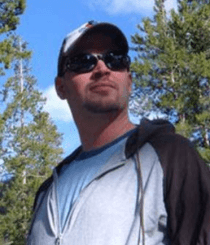Michael Floyd
He is the man behind One For The Road Dollar Baby Film.
SKSM: Could you start with telling me a bit about yourself? Who are you and what do you do?
Michael Floyd: Yes, my name is Michael Floyd, I was born and raised in Fort Wayne, Indiana, then I moved out to Los Angeles for college, and I’ve been here ever since I graduated. I work as a professional voice actor, doing commercials, promos, short films, and recently released my first full length audiobook, called The Myth of Hitler’s Pope, which you can find on Amazon.com (sorry, had to plug it). I’ve been obsessed with films, film making, and Stephen King for quite a long time, so it was very natural that I do an adaptation of one of my favorite stories.
SKSM: When did you make One for the road? Can you tell me a little about the production? How much did it cost? How long did it take to film it?
Michael Floyd: It was quite sometime ago, I started seriously talking to people about it around 2008, then assembled my final cast around early 2009. Several people would agree, then drop out for one reason or another, as they were all professional actors and had to support their families with paid work. After assembling the main cast through my star and cohort, Mark Ridley, I was fortunate enough to persuade Daniel Roebuck, who was still filming LOST at the time, to do a cameo in the bookends of the film. Dan had been in the first voice over project I had done in LA, and I had kept in touch with him, so I was thrilled to have him involved. I also had John Naulin, of Critters, Reanimator, and From Beyond fame there to do the vampire make up effects, which I’m so grateful he was willing to contribute. It was really a dream team of people, except the DP was really young and not too keen on the overall quality, but did shoot on his brand new HD camera and worked for free, so I can’t complain too much.
At the time, there was no kick starter, so I couldn’t really crowd fund the film. Luckily, I found out that was not permitted by the contract, so it worked out. The film, with some help from my parents and some of the cast, ended up costing around $2,500. I could be wrong, as there was no real budget kept.
I lucked out in locations, I found a bar called Froggy’s in Topanga Canyon, which had a bar and fireplace hall, as well as a large parking lot out back to shoot the exteriors. Best of all, the manager let us shoot there for free, although we had some issues with some of the surrounding residents. Overall though, it was a success, i only wish I had a bigger crew. I only had one PA for the big out door shooting days, and I was super lucky to have that. I’ve vowed to have a full, professional crew and a budget for my next project, as its simply too stressful not having those people there to help. The total shooting days was somewhere around 8 or 9 days with pick ups and second unit stuff. While there’s no snow in LA, I was able to shoot a lot of the snowy driving footage at home in Indiana.
SKSM: How come you picked One for the road to develop into a movie? What is it in the story that you like so much?
Michael Floyd: I had been in a car accident when I was 14, and had some major surgery done. The night I returned from the hospital, I couldn’t sleep, so my brother gave me the Night Shift collection to read, and One for the Road was the first story I read. Immediately falling in love with it, I was determined to see it realized as a film. Something about the surreal, utter insanity of my recent trauma really spoke to me through the story, so I very closely related to it. For the next ten years I learned as much as I could about filmmaking, as well as making several other short films with friends in preparation for doing this adaptation. It was a real labor of love, but I’m beyond thrilled I was able to do it!
SKSM: Are you Stephen King fan? If so, which are your favorite works and adaptations?
Michael Floyd: Absolutely, Cujo was the first book of his I ever picked up round the age of seven, and was totally freaked out by the thought of a voice telling me its going to come one step closer to my bed every night. Oddly enough, Carrie was the first story of his I read cover to cover in a day, and became obsessed with his writing. I then started to listen to the audiobooks on long drives, which only enhanced my love of his books, especially when King read it himself. There are so many great audiobooks and films, but listening to King read Home Delivery, is still one of the scariest experiences I’ve had, as well as anything Frank Muller read was exquisite. Unquestionably, The Shawshank Redemption is the best adaptation of his work, and maybe my favorite film, period. Another favorite is Cat’s Eye, which I loved for many different reasons, one being the amount of references it makes to other King stories, as well as having a great connecting character and purpose between the other stories through the cat. There’s just a wonderful, fairytale kind of magic in that film that I love. Both of those films gave me a lot to live up to, and while I wouldn’t rank it anywhere near the best adaptations, I’m certainly proud of what my crew and I were able to accomplish with very little resources.
SKSM: How did you find out that King sold the movie rights to some of his stories for just $1? Was it just a wild guess or did you know it before you sent him the check?
Michael Floyd: I had tracked down a VHS of the Boogeyman and Woman in the Room dollar babies shortly before reading One for the Road, so I was aware of their existence.
SKSM: Was there any funny or special moment when you made the movie that you would like to tell me about?
Michael Floyd: There was a scary moment when a guy came barreling in his truck through our ‘film crew only’ sign we had set up on a door in front of ladder. After about 20 minutes of panicking in terror, we got back to setting up for the outdoor shoot. He came up to me a little later and asked what we were doing, I indicated the sign and ladder, saying we were shooting a movie which is why we had the sign up. He looked over at it and said “Oh, well I hit a lot of shit with my truck, I’ll probably hit those cars over there when I leave. So do you need any supplies, because I’m a special effects guy?” So he gave us tons of fog solutions and sprayed foam all over the ground and trees for us. Even stranger, was that he vaguely knew John Naulin from some project they had done years ago. if that isn’t the weirdest incident, I’m not sure what would be.
SKSM: Do you plan to screen the movie at a particular festival?
Michael Floyd: Currently, I need to tweak a few things with the audio still, but hopefully I can find some free festivals and maybe some dollar baby showcases.
SKSM: How does it feel that all the King fans out there can’t see your movie? Do you think that will change in the future? Maybe a internet/dvd release would be possible?
Michael Floyd: I really hope that changes soon, as I think it would be tremendous to be able to share these adaptations that take so much time and effort with everyone. While I can understand the need for the red tape, I think King’s people should reconsider it so the filmmakers work can be seen by everyone. I don’t think festivals really work as they did before the internet, although having thew film in a festival is good as it forces people to focus on it.
SKSM: What “good or bad” reference have you received on your film?
Michael Floyd: The reviews have been quite positive! While I still have some issues, I’m very pleased with it overall.
SKSM: Did you have any personal contact with King during the making of the movie? Has he seen it (and if so, what did he think about it)?
Michael Floyd: No, however, I did speak with Mick Garris and Harlan Ellison about it, and they were both very encouraging. Harlan is friends with King, and told me actually co-directed the 1980’s Twighlight Zone episode Gramma for which he wrote the adaptation as well. I need to find out how to get it to King, and would love to hear his response to it, good or bad.
SKSM: Do you have any plans for making more movies based on Stephen King’s stories? If you could pick – at least – one story to shoot, which one would it be and why?
Michael Floyd: I did do a recording of I Am the Doorway as an audiobook, which oddly enough had never been recorded in audiobook form, as One for the Road had never been made in to a film before. I had really wanted to do a follow up with some of my same cast in a Popsy dollar baby, but it took so long to finish One for the Road, I fear that may not happen. I’d really love to do an adaptation of The Breathing Method, the last book from the Different Seasons collection, although I was heart broken to read a studio already took an option out on it. Another I’d love to do would be my own version of Crouch End, because I’m a huge Lovecraft fan and desperately need to see it done right. I’d also love to do Ballad of the Flexible Bullet, which I think would require some David Lynchian weirdness, that I’d love to try my hand at. Ahh, there are just so many…
SKSM: What are you working at nowadays?
Michael Floyd: I’m currently working on several podcasts, a scifi film anthology with some fellow filmmaker friends, and trying to decide what my next audiobook will be. Of course, I’m also deciding what King character to be for Halloween.
SKSM: Thanks for taking the time to answer my questions. Is there anything you want to say to your fans?
Michael Floyd: I have fans? Haha, well I’d love to thank them and you for taking the time correspond with me! This project has been an insanely lugubrious labor of love, and having support in doing it has only made my experience more gratifying. So thank you to everyone in the Stephen King dollar baby fan community for their love and support of us struggling filmmakers, I’m truly humbled by it.
SKSM: Do you have anything you’d like to add?
Michael Floyd: Yes, go sign up at Audible.com, make The Myth of Hitler’s Pope your first purchase, then stay a member for two months, and enjoy a Stephen King audiobook your second month of being a member. I will love you forever!! Also, stay scared and have a happy Halloween!!

















